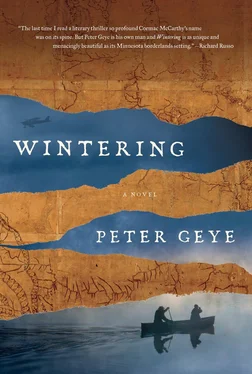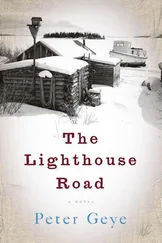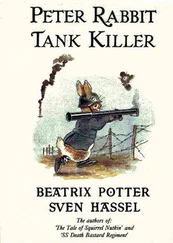Gus thought of Charlie’s first claim out on the bay, that now was when the fun really started. “To kill him?”
“You’d rather he killed us?”
Gus didn’t answer.
“Because he will, sure as the day is long. And he’ll take insane pleasure in doing it. So I suggest you listen up and clear your head. Get it straight. We’re going to find Charlie, and we’re going to end this. We’ll start with his goddamn plane.”
Harry stood up, adjusted the Duluth pack, and rested a hand on the pistol. “I heard his plane come from the north last night. Likely he landed on the south end of the lake, so let’s get down there.”
“You go.”
“Gus?”
“I’m not going anywhere.”
“Get up, bud.”
“You’re a liar.” He spoke softly. “You’re as crazy as he is.”
“Do you have your mittens? Put them on,” Harry said. “You get frostbit, your hands’ll be worthless. Put your mittens on and get up.”
Gus jumped to his feet and sprang again at his father, punching him in the chest with both fists. Harry stumbled but didn’t fall and instead stepped right back in to Gus. He took him in his arms and hugged him so tight it squeezed the breath out of him. “Someday you’ll understand all of this. You will. I promise. You have no reason to, but right now you’ve got to trust me.”
Gus pushed him away. “I don’t trust you. I hate you. I hate all of this.”
“I do, too. I do. But we’re in it now, right up to our necks. And I’m not about to leave you here.”
Gus sat back down and leaned against the tree.
Harry knelt again. “Do you remember, way back when, that I said you were my advantage?”
Gus didn’t so much as look up.
“This is what I was talking about. You are my advantage now.”
“What’re you talking about?” He put his hands up over his ears. “I can’t listen to you anymore. Go. Jesus Christ, get away from me!”
“He wants us split up, Gus. That’s the only chance he’s got left.”
“Why don’t you ever listen? I couldn’t care less about your fight with Charlie. I don’t even care what happens next. Just leave me alone.”
“You can’t stay here, Gus. We have to get the hell moving. Listen to me, bud!”
“You listen.” Gus finally looked up at him. “Go to hell. Just go to hell.”
“You have to come, Gus. You can’t stay here. This is no place to be.”
“Well, it’s where you brought me.”
Harry took the pack from his shoulders, pulled the sleeping sack out, and tossed it to him. Then he handed him the belt and holster. “Don’t move. Don’t start a fire.” He buckled the pack again, put it on his shoulders, shook his head, and slipped it off again. “If you have to run, take the pack. Better still, stay here and don’t move. I’ll be back.”
I VISITED Rebekah Grimm the day before she died. She had a private room at the rest home, a single bed pushed up against one wall. A small black-and-white television on a shelf under a window that overlooked a grassy, man-made knoll where Norway pines had died not long after they were planted. There was a painting of a schnauzer dog hanging on the wall above her bed, a mirror hanging over a small chest of drawers. Hairbrushes and bottles of lotions and perfumes sat atop the chest, giving off a lovely fragrance. Getting to her room was always a relief, as other rooms reeked of soiled bed linens and heaping ashtrays, the stench leaching into the hallway.
The day before she passed, she was sitting in her bed and staring out the window. A sorry view, compared with the one she’d had for so many years from the third floor of the apothecary. Even though she was fully blind by then, this irrelevant fact saddened me more than any other about her condition and situation.
She always kept herself neat. Whereas most of the folks waiting out the last years of their lives here were happy to spend all day in their pajamas, or even less, Rebekah dressed every day, bathed twice a week, and, when Bonnie Hanrahan’s daughter came for just this purpose, had her hair done each Saturday. But the day before she died she was especially done up, in a pink cotton dress and a white cardigan sweater and the pink cloche hat she saved for only the best occasions. Her fingernails had been painted to match the hat. She held a black patent-leather purse in her hands.
“Well, aren’t you a picture of pretty?” I said.
“I wonder if you’ll take me to lunch, Miss Lovig.” All those years after we met, that’s what she still called me.
“Are you sure?” I said. “Did you run this past Janice?” This was the head nurse at the home.
“Am I a prisoner here?”
“Of course you aren’t.”
“Then I’d like you to take me to lunch at the Traveler’s Hotel.” She lifted herself from the bed and into her wheelchair, which was required in the halls of the home. “If you would.”
Once we were seated, she ordered tea and rabbit stew and spread her napkin across her lap.
“This is the first time you’ve been out in a long while,” I said.
“I don’t feel the need all that often.”
“Until today.” And this was a question.
She fingered the napkin on her lap and turned her eyes up to the window. They were as milky as the pitcher of cream waiting beside her tea. “When I die,” she said, “I would like to be buried in the cemetery, under a marble pillar with the words ‘I Have Loved’ inscribed beneath my name. Lenny’s boy, Mace Washburn, has been paid for this. He understands my wishes.”
I didn’t — couldn’t — respond.
“Is that too much to ask?”
“Why are you talking about this now?”
She wiped the corners of her mouth with her napkin. “Miss Lovig, I’m as old as the town itself. If I don’t die tomorrow, I will soon enough. I’d like to have this settled before then.”
“Of course.”
She sipped her tea and wiped her lips again. “And please make sure my grave is as far from Hosea’s as possible. Would you do that?”
“I will.”
“When I’m buried, make sure I’m well dressed. I’d prefer to be wearing a hat — this hat, my pink cloche.” She reached for her purse on the edge of the table, opened it, felt inside, and pulled out a photograph. “Make sure this goes down with me.” She handed me a snapshot of her and Odd Eide standing outside a brick building, dressed to the nines. The resemblance between generations — Odd, Harry, Gus, and his son, Tom — was uncanny. They were all the same men, just wearing different shirts and trousers. “It will be in this purse, which will be in my closet. That is my final wish.”
The waiter brought Rebekah’s stew and set it before her, then laid my salad in front of me and offered to refill our teacups. Once he left, Rebekah felt for her spoon with one hand and the rim of the bowl with the other. Before taking a bite, she lifted her blank eyes to me and said, “Thank you,” then chewed slowly, her eyes closed. When she opened them, she said, “Miss Lovig — Berit — you’ve been very good to me. I couldn’t have lived as well as I did without you.”
She didn’t eat another bite of her stew, and when I finished my salad we left. She asked me to walk her down the Lighthouse Road. It was warm and breezy and she covered her hat with her hands. Once we got to the lake, she just stood there. No easy thing for her. I asked if I could help but she shushed me. She waited there for a minute, feeling the wind on her face.
“Will you take me back, please?” she said.
And I did.
The next morning I woke to the telephone ringing. It was Janice from the home. Could I come quickly? When I hurried there, Janice was at the front door. She squeezed my hands and walked me down the hallway to the room where Rebekah lay in her bed, the sheet pulled up to her neck. Her eyes were closed. She was still as a stone.
Читать дальше












